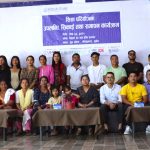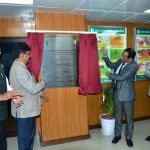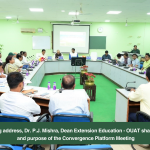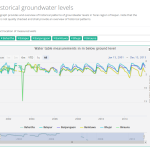- CSISA COVID Closure Workshop Showcases Success in Empowering Farmers and MSMEs
Salin Acharya, Assistant Research Associate presented the overall outcome of CSISA Activity. Photo, Nabin Maharjan [caption id="attachment_7301" align="alignnone" width="1024"] Salin Acharya, Assistant Research Associate presented the overall outcome of CSISA Activity. Photo, Nabin Maharjan[/caption] Bardiya, Nepal – June 27, 2024 – The CSISA COVID Closure Workshop, held on June 25, 2024, Gulariya, Bardiya district marked a successful conclusion to CSISA's COVID response work in the region. The workshop served as a platform ...
- Closure Event of CSISA/Nepal COVID Response Activity in Surkhet
We are thrilled to announce the successful completion of the CSISA COVID-19 program for Surkhet hub. The program kicked off from July 2021 - June 2024. Surkhet team hosted the event and officially concluded it's episode in Birendranagar, Surkhet on June 4, 2024. This program wouldn't have been possible without the incredible collaboration and contributions of all our partners, beneficiaries, and especially the smallholder farmers we've supported. We extend our deepest ...
- MEL Cell established at the Division of Agricultural Extension, Indian Council of Agricultural Research
The Cereal Systems Initiative for South Asia (CSISA) project in India works closely with the Indian Council of Agricultural Research (ICAR) Division of Extension, Krishi Vigyan Kendras (KVK), State Agricultural Universities (SAUs) and state governments to strengthen the research for development (R4D) system by integrating convergence processes with evidence generation and feedback from large-scale surveys with farmers. In 2018-2019, CSISA embarked on an ambitious task of generating data for evidence: Landscape ...
- Convergence Platform (CP) and Landscape Diagnostic Survey (LDS) review meeting
On 22 February, CSISA facilitated a Convergence Platform (CP) meeting with LDS (pulses) review, jointly led by the Directorate of Extension Education, OUAT (Bhubaneswar) and ICAR-ATARI (Kolkata) in Bhubaneshwar, Odisha. Project partners, public and private stakeholders (around 57 participants) from Odisha and West Bengal, along with progressive farmers and Service Providers, participated in the meeting. The data and research on DSR-suitability landscapes, varietal performance, and overall productivity, profitability and sustainability of mechanized-DSR ...
- Digital Groundwater Monitoring System: A Critical Foundation to Inform Natural Resources Management Policy and Sustainable Irrigation Development in Nepal
This blog’s writers are Saral Karki, research associate—data management and analysis, and Rudriksha Rai Parajuli, technical partnerships manager and groundwater team. In Nepal, government policy focuses on expanding the use of groundwater for irrigation to enhance agricultural productivity. However, this strategy faces several challenges, including a lack of comprehensive data on groundwater resources and appropriate cropping patterns to guide where, and for what, crops groundwater should be tapped for irrigation. Parts ...






